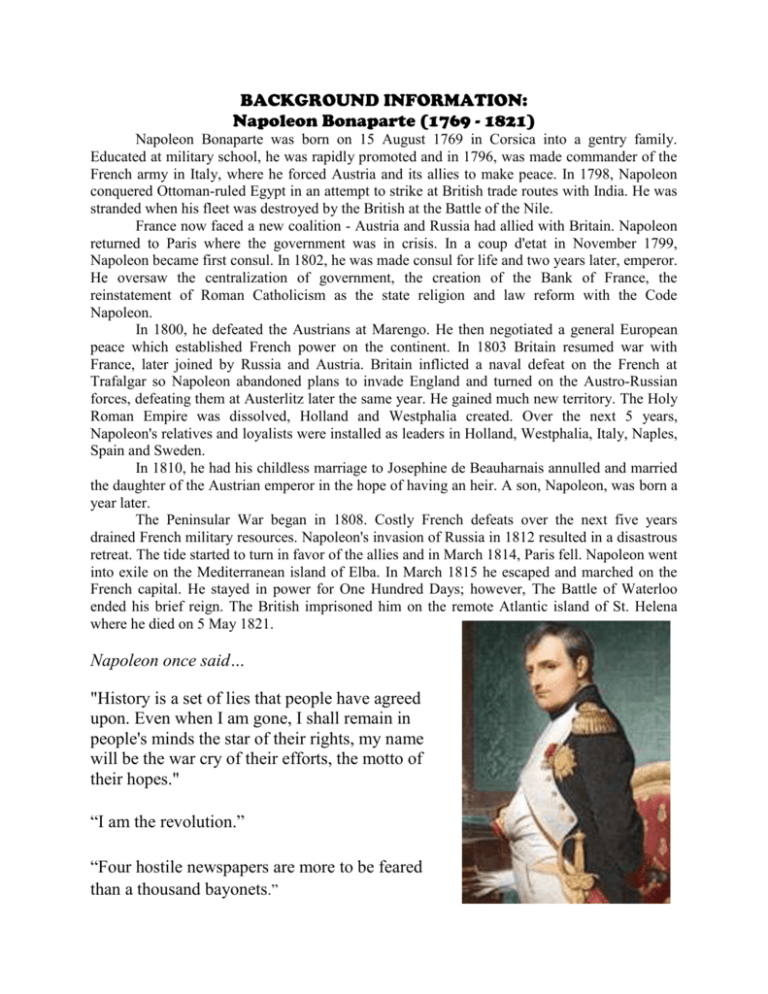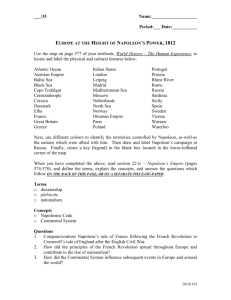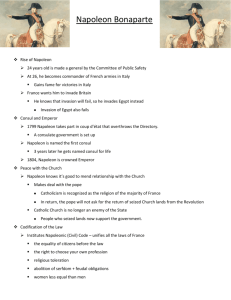Napoleon Bonaparte: Hero or Tyrant? Worksheet
advertisement

BACKGROUND INFORMATION: Napoleon Bonaparte (1769 - 1821) Napoleon Bonaparte was born on 15 August 1769 in Corsica into a gentry family. Educated at military school, he was rapidly promoted and in 1796, was made commander of the French army in Italy, where he forced Austria and its allies to make peace. In 1798, Napoleon conquered Ottoman-ruled Egypt in an attempt to strike at British trade routes with India. He was stranded when his fleet was destroyed by the British at the Battle of the Nile. France now faced a new coalition - Austria and Russia had allied with Britain. Napoleon returned to Paris where the government was in crisis. In a coup d'etat in November 1799, Napoleon became first consul. In 1802, he was made consul for life and two years later, emperor. He oversaw the centralization of government, the creation of the Bank of France, the reinstatement of Roman Catholicism as the state religion and law reform with the Code Napoleon. In 1800, he defeated the Austrians at Marengo. He then negotiated a general European peace which established French power on the continent. In 1803 Britain resumed war with France, later joined by Russia and Austria. Britain inflicted a naval defeat on the French at Trafalgar so Napoleon abandoned plans to invade England and turned on the Austro-Russian forces, defeating them at Austerlitz later the same year. He gained much new territory. The Holy Roman Empire was dissolved, Holland and Westphalia created. Over the next 5 years, Napoleon's relatives and loyalists were installed as leaders in Holland, Westphalia, Italy, Naples, Spain and Sweden. In 1810, he had his childless marriage to Josephine de Beauharnais annulled and married the daughter of the Austrian emperor in the hope of having an heir. A son, Napoleon, was born a year later. The Peninsular War began in 1808. Costly French defeats over the next five years drained French military resources. Napoleon's invasion of Russia in 1812 resulted in a disastrous retreat. The tide started to turn in favor of the allies and in March 1814, Paris fell. Napoleon went into exile on the Mediterranean island of Elba. In March 1815 he escaped and marched on the French capital. He stayed in power for One Hundred Days; however, The Battle of Waterloo ended his brief reign. The British imprisoned him on the remote Atlantic island of St. Helena where he died on 5 May 1821. Napoleon once said… "History is a set of lies that people have agreed upon. Even when I am gone, I shall remain in people's minds the star of their rights, my name will be the war cry of their efforts, the motto of their hopes." “I am the revolution.” “Four hostile newspapers are more to be feared than a thousand bayonets.” Napoleon Bonaparte: A Hero, Not a Tyrant Napoleon brought an end to the violence of the French Revolution. The rule of the Directory was marked by corruption, financial difficulties, political purges, and a fateful dependence on the army to maintain control. The five directors were in constant conflict and the military began to loose ground. With the support of the army and several government members, Napoleon overthrew the failing Directory. The Napoleonic Code put the ideals of the French Revolution into law and spread those ideals throughout Europe. When Napoleon took power, the laws of France were in chaos. It was difficult to determine what law applied in any given situation and laws were not equally applied to everyone. Napoleon re-wrote the laws so they were clear, based on reason, and founded on the notion that all men were equal before law. The laws guaranteed individual rights and the security of property. Napoleon came to power with the popular support of the French people. The reason that Napoleon became Consul for Life is that the French people rewarded him with the office for bringing peace to France. The French people confirmed his title as emperor with a plebiscite (a vote by which the people of an entire country express an opinion on a choice of government or ruler). Even after military defeat and exile on the island of Elba, Napoleon was able to return to France for “the Hundred Days” with military and popular support. This Hundred Days shaped Napoleon’s legacy, as he adopted many liberal principles during this time. This inspired some to take the gamble of giving him their support, and it left the image of a "Napoleon of the people" in some minds. The peasantry of northern France, in particular, who liked the pageantry of the regime and the high wages for rural labor caused by the wars, would remember the Napoleonic epoch fondly as a time of glory and prosperity. For some in the lower classes, his charismatic style seemed a welcome change from boring run-of-themill monarchs. Napoleon made reforms in education. He believed education was important to produce citizens that could fill the positions in his government and military. He made education more available to the middle class and built new schools for boys. Napoleon reformed the French central government making it more efficient. Advancement in government jobs and the military was not based on merit rather than rank. The tax system was equally applied to all. Napoleon brought peace to France, both in foreign affairs and domestically. Between 1798 and 1802, Austria, Russia, and Britain were all joined in the Second Coalition against France. Napoleon led the French armies and brought peace to France in 1802, ending the Second Coalition. Napoleon brought domestic peace by allowing political refugees to stay in France and filling his government offices with people with different opinions. Napoleon Bonaparte: A Tyrant, Not a Hero Napoleon was the model autocratic, popular leader who takes absolute power with the will of the people. Because he had brought peace to France through his policies and military victories, Napoleon was given the title of Consul for Life in 1802. The Republic had essentially ceased to exist and a new authoritarian state was taking shape. Elections no longer had much meaning. Two years later, Napoleon announced that he would be crowned emperor and power would now pass to his eldest son. Hitler, Mussolini, Franco, Pinochet and others consciously followed his path. The Napoleonic Code did not guarantee individual rights for women and blacks. Women had played a significant role in the French Revolution, such as leading the attack on the Bastille and writing the Declaration of the Rights of Woman; however, Napoleon did not recognize women as an equal. Instead, husbands and fathers gained nearly complete control over their wives and children under Napoleon. Blacks were also denied individual rights. Napoleon reestablished slavery and the slave trade in French colonies in the Caribbean, as well as denying political rights to free blacks. Although individual rights were guaranteed in French law and the Napoleonic Code, Napoleon retained the authority to suspend these rights at will. Newspapers were suppressed, unruly theaters closed, and critical authors sent into exile. But those who deified him were crushed under his iron hand. Joseph Fouche, the head of the secret police, extending Emperor Napoleon's reach into every aspect of French society through a vast network of spies. Napoleon personally oversaw the productions of plays in the theaters of France. If Napoleon disapproved of a playwright's work, his career was over. Napoleon also controlled the press, dropping the number of newspapers in Paris from over sixty in 1799 to four by 1814. Napoleon increasingly copied the court of the old regime monarchy. While confirming the legal gains of the third estate, Napoleon gave authority back to the old regime nobility. He hoped to take his place among the legitimate monarchs of Europe and even married a Habsburg to establish his credentials. Napoleon did not believe in educating girls. He believed they could learn everything they needed from their mothers, and were not meant to be active citizens. Napoleon was an imperialist, which led to fall from power and loss of popular support. He made himself king of a newly amalgamated Italy in 1805, which brought together extensive territories in northern and central Italy. He was able to put his relatives on the thrones of Europe, because he could defeat all his rivals via a straightforward land invasion. Great Britain, however, was protected from this threat. Eventually, Napoleon fell from power because he could not dispose of either Great Britain or Russia. These two countries led a coalition to take down Napoleon, and ended in his exile. Napoleon Bonaparte: A Hero, Not a Tyrant "A Grateful France Proclaims Napoleon the First Emperor of the French" In this engraving, Roman and contemporary themes are combined to glorify the new emperor. The absence of any clear representation of revolutionary liberty shows Napoleon moving away from the events of the preceding decade. Napoleon Bonaparte: A Tyrant, Not a Hero "Triumph of the Year 1813" Napoleon’s efforts to dominate central Europe kindled a huge reaction, as national feelings soared among the many ethnic groups inhabiting the area. While these feelings would eventually lead to great internal conflicts, at first they were focused on francophobia and hostility to Napoleon. This cunning image shows a gnarled face made of Napoleon’s victims and an epaulet with fingers grasping toward conquest. Napoleon Bonaparte: A Hero or a Tyrant? 1. List the important events in Napoleon Bonaparte’s life. 2. What are the three titles that Napoleon had in France? Napoleon is a… Supported by these arguments made in round one: Supported by these arguments made in round two: Supported by the this information from the paintings: Hero Tyrant 1. 1. 2. 2. 3. 3. 1. 1. 2. 2. 3. 3.




